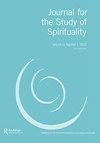The Divine Feminine: Tao Te Ching
IF 0.8
0 RELIGION
引用次数: 1
Abstract
itation’ (p. 129). In the corresponding essay in Part 4 (The world of ‘something great’ in the eyes of a life scientist), the eponymous scientist brings his own beliefs regarding spirituality into conversation with his scientific knowledge and predicts a bright future for Japanese spirituality: ‘If we switch on that essence, then I believe it will by all means be Japan’s turn to shine as a cultural and moral power in the twenty-first century’ (p. 210). These provide something of a counterbalance to the theoretical discussion, although each is demanding in its way. By definition, any edited volume is a mixed bag. In a broad-ranging collection, drawing on a wide range of scholars and experts, there are bound to be some chapters that work better than others, some elements which seem to be more or less integrated into the overall project, and each reader will have their preferences and perspectives. The present volume is no exception to this general rule, but the overall quality and tone of the contribution are very impressive. In addition (and despite some unevenness in the execution), the structure and content of the book amply support the claim in the introduction that, for Japanese people, spirituality just happens, largely unrecognized, as part of practical, shared and social life: the theory and theology come later. This, for me, is the key message worked out through the book: in a Western context in which the very notions of a collective life and a spirituality hidden away in our collective culture are new and potentially fruitful, it is one that deserves to be heard more widely.神圣的女性:道德经
’(第129页)。在第四部分的相应文章(生命科学家眼中的“伟大”世界)中,同名科学家将自己对灵性的信仰与他的科学知识进行了对话,并预测了日本灵性的光明未来:“如果我们开启这种本质,那么我相信日本将以各种方式成为21世纪的文化和道德强国”(第210页)。这些都为理论讨论提供了某种平衡,尽管每一个都有自己的要求。根据定义,任何编辑过的书都是一个大杂烩。在一个范围广泛的合集中,借鉴了广泛的学者和专家,必然会有一些章节比其他章节更好,有些元素似乎或多或少地融入了整个项目,每个读者都会有自己的偏好和观点。目前的卷也不例外,这一一般规则,但整体质量和贡献的基调是非常令人印象深刻的。此外(尽管在执行上有一些不平衡),这本书的结构和内容充分支持了引言中的说法,即对日本人来说,灵性只是作为实践、共享和社会生活的一部分而发生的,在很大程度上没有被认识到:理论和神学是后来出现的。对我来说,这是通过这本书得出的关键信息:在西方的背景下,集体生活和灵性的概念隐藏在我们的集体文化中是新的和潜在的成果,这是值得更广泛地听到的。
本文章由计算机程序翻译,如有差异,请以英文原文为准。
求助全文
约1分钟内获得全文
求助全文
来源期刊

Journal for the Study of Spirituality
RELIGION-
CiteScore
2.50
自引率
7.10%
发文量
25
期刊介绍:
Journal for the Study of Spirituality is a peer-reviewed journal which creates a unique interdisciplinary, inter-professional and cross-cultural forum where researchers, scholars and others engaged in the study and practices of spirituality can share and debate the research, knowledge, wisdom and insight associated with spirituality and contemporary spirituality studies. The British Association for the Study of Spirituality (BASS) organises a biennial international conference and welcomes enquiries about membership from those interested in the study of spirituality in the UK and worldwide. The journal is concerned with what spirituality means, and how it is expressed, in individuals’ lives and communities and in professional practice settings; and with the impact and implications of spirituality in, and on, social policy, organizational practices and personal and professional development. The journal recognises that spirituality and spiritual values can be expressed and studied in secular contexts, including in scientific and professional practice settings, as well as within faith and wisdom traditions. Thus, Journal for the Study of Spirituality particularly welcomes contributions that: identify new agendas for research into spirituality within and across subject disciplines and professions; explore different epistemological and methodological approaches to the study of spirituality; introduce comparative perspectives and insights drawn from different cultures and/or professional practice settings; aim to apply and develop sustained reflection, investigation and critique in relation to spirituality and spiritual practices; critically examine the values and presuppositions underpinning different forms of spirituality and spiritual practices; incorporate different forms of writing and expressions of spirituality.
 求助内容:
求助内容: 应助结果提醒方式:
应助结果提醒方式:


